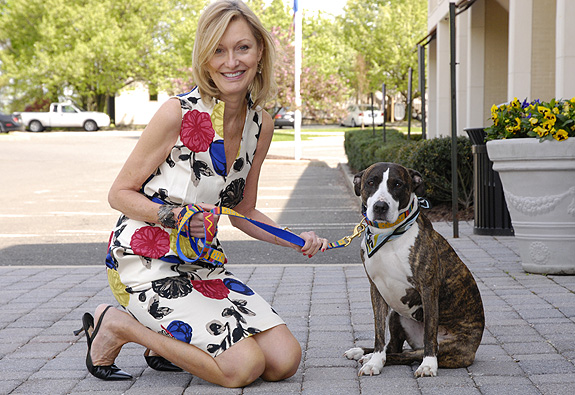By Sue Smith, for StubbyDog.org
“Truffle.” The sign on her kennel caught my eye when I arrived one evening seven years ago for my dog-walking shift at PAWS in Norwalk, Conn. The closer I came, the more this American Staffordshire Terrier wiggled. I was hooked!
Still, it took three months for us to adopt her. Being a new volunteer at the shelter, I had no experience with “Pit Bulls” and I wanted to make sure I really got to know her. I brought her home a number of times first. My husband, Steve, and I learned that she was loving, intelligent and the best ball player we’d ever seen!
Two years later, Steve was offered a position in London. Learning that the U.K. had changed their quarantine policy for dogs, we began making plans for the move. The new system allowed dogs to serve “home quarantine,” which involved simply a new rabies shot, microchipping and periodic blood testing for six months. The dog would then be free to enter the U.K. and go directly to its new residence.
We complied with all of the requirements. Two months before our departure, I was browsing the immigration website and noticed a section entitled “Prohibited Animals.” Out of curiosity, I clicked on it — and to my shock found that American Pit Bull Terriers were on the list of banned dog breeds. I made many frantic calls to the British Consulate in New York and to Immigration at London Heathrow and learned that Immigration has the right to “seize and destroy” any banned dog trying to enter. There is no temperament testing, and the judgment goes strictly on body type.
Steve was already working in London, and we had rented a house. When I realized that trying to fight the bureaucracy was futile, I devised a plan to keep both my dog and my husband. I decided that a two-week trip to London every six to eight weeks could work; Steve would also be attending meetings in New York periodically.
As for Truffle’s care while I was away, the best option at that time was the kennel at her vet’s office. The staff already loved her, and they began keeping her in the reception area during the week when she boarded. The manager even started taking her in the car when making runs to the bank. We now have a yoga instructor with a flexible schedule to house sit as an alternative to the kennel. In both situations, Truffle is very comfortable and does well in my absence.
This is Steve’s fifth and final year in London. We’ve made the best of the circumstances. Although we’d obviously have preferred to be together as a family, things have worked out. I know that so many stories of breed discrimination end more sadly. It is an issue we will speak out against at every opportunity.
This article first appeared here on StubbyDog.org.









